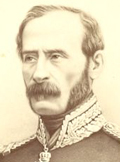 |
Louis-Eugène Cavaignac
b. 15 Oct 1802, Paris
d. 28 Oct 1857, Ourne, Sarthe |
| Title: |
Chef du Pouvoir exécutif (Chief of the Executive Power) [see a note on style] |
| Term: |
24 Jun 1848 - 20 Dec 1848 |
| Chronology: |
24 Jun 1848, executive authority handed to Cavaignac, decree of the Assemblée nationale constituante (Constituent National Assembly), meeting of the Assembly, Versailles [1] |
|
28 Jun 1848, resigned executive authority, message submitted to the Constituent National Assembly; executive authority conferred on Cavaignac with the title of Président du Conseil des ministres (President of the Council of Ministers), decree of the Constituent National Assembly, meeting of the Assembly, Versailles [2] |
|
20 Dec 1848, resigned executive authority immediately after the proclamation of the election results of the President of the Republic, meeting of the Constituent National Assembly, Palais-Bourbon, Paris [3] |
| Biography: |
| Second son of Jean-Baptiste Cavaignac, member of the Convention nationale (National Convention) and Conseil des Cinq-Cents (Council of Five Hundred); educated at the Collège Sainte-Barbe, École polytechnique (1820-1822) and artillery school in Metz; joined the army in 1824 and was promoted to lieutenant (1826); after a military campaign in Morea promoted to captain (1829); served with distinction during the French conquest of Algeria in the 1840s; promoted to lieutenant-colonel (1840), colonel (1841), brigadier general (1844); appointed governor of the province of Oran (1847-1848); appointed governor general of Algeria (24 Feb 1848 - 29 Apr 1848) and promoted to major general (2 Mar 1848); refused to accept the appointment (20 Mar 1848) as minister of war made by the Provisional Government; returned to France after election as people's representative to the Assemblée nationale constituante (Constituent National Assembly) (1848-1849) by the départements of Seine and Lot; opted to represent Lot; served as vice-president of the Assembly (5 May 1848 - 5 Jun 1848); minister of war (17 May 1848 - 28 Jun 1848); called by the Assembly to suppress a large workers' revolt in Paris (June Days, 23-26 Jun 1848); entrusted with dictatorial powers (24 Jun 1848); successfully directed the suppression of the revolt and laid down the executive authority (28 Jun 1848); recognized by the Assembly as bien mérité de la patrie (28 Jun 1848); executive authority conferred by decree of the Assembly, appointed President of the Council of Ministers (28 Jun 1848); lost presidential election to Louis-Napoléon Bonaparte (10 Dec 1848); elected to the Assemblée nationale législative (Legislative National Assembly) (1849-1851); imprisoned after the coup d'état of 2 Dec 1851; elected to the Corps législatif in 1852 and 1857, but refused to swear an oath of allegiance to Bonaparte and was barred from taking his seat. |
| Biographical sources: Dictionnaire des parlementaires français 1789-1889, |
| |
| [1] |
Compte rendu des séances de l'Assemblée nationale, 2:188; Bulletin des lois de la République française. Xe Série. Tome premier (Paris: Imprimerie nationale: Juillet 1848), p. 569, N° 47, n° 503: Décret par lequel l'Assemblée nationale se maintient en permanence, met Paris en état de siége, et délègue les Pouvoirs exécutifs au Général Cavaignac. |
| [2] |
Compte rendu des séances de l'Assemblée nationale, 2:238-241; Bulletin des lois de la République française. Xe Série. Tome premier (Paris: Imprimerie nationale: Juillet 1848), p. 576, N° 47, n° 518: Décret qui confie le Pouvoir exécutif au Général Cavaignac. |
| [3] |
Compte rendu des séances de l'Assemblée nationale, 6:355. |
|
Image: photographic studio of Neurdein. |

